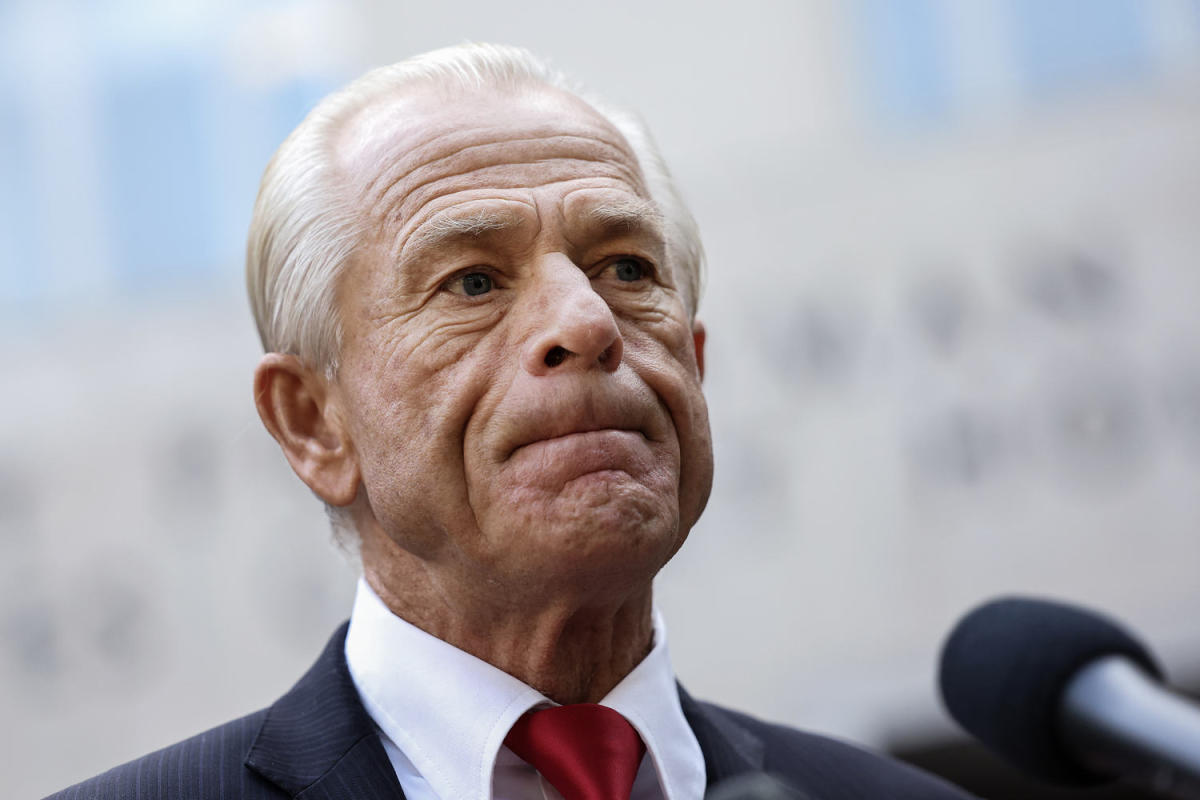WASHINGTON — Former Trump White House adviser Peter Navarro was sentenced to four months in prison Thursday for criminal contempt of Congress, with a federal judge telling him he was “not a victim” or a target of political persecution, as much as he may have proclaimed otherwise.
Navarro was convicted in September on two counts for refusing to testify and provide documents to the House Select Committee to Investigate the January 6th Attack on the United States Capitol, which issued its report and dissolved in late 2022 after Republicans won control of the House.
The charge carried a mandatory minimum sentence of a month in prison. Federal prosecutors had sought six months for Navarro, saying he, “like the rioters at the Capitol, put politics, not country, first, and stonewalled Congress’s investigation.” Navarro, prosecutors said, “chose allegiance to former President Donald Trump over the rule of law.” Federal prosecutors said Navarro “thumbed his nose” at the House committee investigating the Jan. 6 attack on the U.S. Capitol.
U.S. District Judge Amit P. Mehta handed down the sentence Thursday and also ordered Navarro to pay a fine of $9,500.
Before he issued the sentence, Mehta told Navarro that the words “executive privilege” are not a “magical incantation” or a “get out of jail free card” to get out of a subpoena.
“What I find disappointing is that in all of this, even today, there’s little acknowledgment of what your obligation is as an American — to cooperate with Congress, to provide them with information that they’re seeking,” he said. “Fine, you think it’s a political hatchet job, it’s domestic terrorists running the committee. They had a job to do, and you made it harder. It’s really that simple.”
“You are not a victim,” Mehta continued. “You are not the object of a political prosecution, you aren’t. You have received every process you are due.”
Navarro appealed his conviction immediately after sentencing.
During the hearing, Assistant U.S. Attorney John Crabb said the federal prosecutors in the U.S. Attorney’s Office for the District of Columbia were committed to “enforcing the law without fear, favor or political influence” and called Navarro’s prosecution “righteous.”
“The defendant believes he is above the law, but no one is above the law,” Crabb said. “We are a nation of laws. The rule of law is crucial to a functioning democracy.”
Navarro helped spread misinformation about the 2020 election after Trump’s loss and issued a report that Trump falsely said proved that it was statistically “impossible” for him to have lost the election. Trump referred to the report in his infamous “will be wild” tweet on Dec. 19, 2020, encouraging supporters to travel to Washington for a “Big protest” on Jan. 6. That tweet, many Jan. 6 defendants have said, is what drew them to Washington.
Navarro’s lawyer asked that any sentence imposed Thursday be immediately stayed because of “novel issues” presented in the case, including Navarro’s purported belief that Trump had invoked executive privilege.
“He acted the way he did because he thought he was duty-bound to do it,” lawyer Stanley Woodward argued Thursday.
Mehta did not immediately rule on the stay request and has asked for further briefing. Navarro will have one week to submit a brief on the subject, after which the judge will rule.
Crabb said before the sentencing that Navarro did not have a good faith basis to invoke privilege. “The defendant brazenly defied Congress,” he said.
Federal prosecutors referred to the case of right-wing podcaster and former White House official Steve Bannon in their sentencing memo. Bannon was sentenced to four months in prison on a similar contempt conviction in October 2022 but is seeking to overturn his conviction and has not yet served any time.
“Like Stephen Bannon before him, throughout the pendency of this case, the Defendant has exploited his notoriety — through courthouse press conferences, his books, and through podcasts — to display to the public the reason for his failure to comply with the Committee’s subpoena: a disregard for government processes and the law, and in particular, the work of the Committee,” federal prosecutors wrote in a sentencing memo. “The Defendant wrote a book on the very topic that was the subject of the Committee’s subpoena. He was happy to tell the world what he knew — but not Congress.”
CORRECTION (Jan. 25, 2024, 11:05 p.m. ET): A previous version of this article misspelled the first name of Navarro’s lawyer. He is Stanley Woodward, not Stanely.
This article was originally published on NBCNews.com





